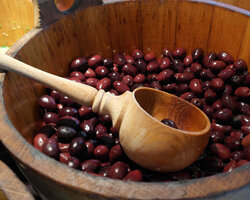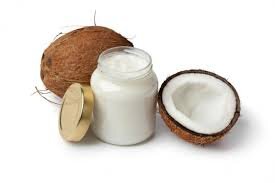
The Essential Nature of Oils
Oils are vital for the function of every cell in nature.
Despite their current status as a national killer, oils cannot be ignored as an essential nutrient.
It is only the toxic nature of the oils that we manufacture that leads them to be fattening and toxifying.
The Well-Oiled Machine
Oils have been taking bit of a battering in the last few years. We have lost sight of their role as a biological necessity, and started to see them as a problematic element in our food. This is both sad and dangerous, as it shows how we are prioritising concepts of beauty over concepts of health. How sad is that?!
In explaining this, I would like to point to a difference between a cell’s call for the nutrition it needs, and the mental choice we make in response. For this is the root to much myth and legend.
Cells know what they need, and they know how to call for it. We have a vague conscious connection to this call via our urge to taste and eat certain foods, but it is often buried below food stories, eating patterns and emotional concerns. Through these interpreting layers, we rarely hear the biological concern, but chose foods based upon every consideration but the biological. So, the role of this article is to focus upon the long forgotten origins of why we eat at all: Nutrition.
A large point in this is the specificity of the digestive process: That each compound to be extracted from food needs exact enzymes to do so, and the development and implementation of these enzymes has taken millions of years of evolution to complete. You can't just throw any old fat into the system and expect us to be able to work with it if we cannot create the tools to use it. And so the crux of this is whether we have a long enough relationship with a given food - that alone will determine its usability in the body.
We can see the importance of this in oils especially, because the body has taken the time and effort, over millions of years of evolution, to develop an organ whose entire role is to aid the assimilation of fats. The fact that the body has an organ specific to the job proves the importance of oils as a vital component.
So, if they are so important, why are we now trying to get them out of our diet ? Many things are now even sold on their lack of fat. Obviously something has changed.
Cornerstone Nutritional Component or National Killer?
The primary role of oils in the system is to maintain cellular integrity. They form a vital layer in the cell wall, repelling water, thus keeping the inside in, and the outside out. Long before the body makes choices about whether oils can be used as fuels, or stored away, or to lubricate joints, the cells have to feel satisfied that they have enough - and there are trillions of them !
So, there is quite a strong urge to fulfil this requirement, and we have developed a distinct sensation for identifying fats - we just love the taste of them, and we will eat just about anything if there are sufficient oils upon it. White flour, potatoes, a bowl of grains - all thoroughly tasteless and unattractive on their own, suddenly become much loved, traditional foods once their sexed up with a little butter / cheese / cream / gravy, etc…
However, oils are also very delicate, and do not handle exposure to heat / light / oxygen well. Most are rendered completely useless through the processes we take them through, so they do not assimilate properly; are often oxidised beyond use; and most get lost along the way, playing havoc with the blood balance.
We don't need to discuss oils in terms of chain-length or saturation levels to understand this, we only need to see if they are in a state that the body can use. IE: are they raw. if not, they won't work easily.
Because the nation gets most of its oils from cooked foods, the hungry cells don’t get what they need. So the cellular call remains, and we end up in a loop, whereby we are eating foods that satisfy our taste for these oils, but the lack of cellular gratification means the cycle never completes.
Of course, our taste buds were never taught to distinguish between useful and useless oils, because there are no useless oils in nature. So, they have become the easy choice in making foods taste more wholesome and nourishing.
Despite how they taste, most of these foods use more resources than they provide. Much time is taken to prepare them for digestion - which cannot complete - and then they will tend to ferment and go rancid, requiring even more resource to stem the tide of fermentative bacteria and clear up their toxic residues.
Make no mistake, oils are essential nutrients, found in every cell in nature, and needed by every cell in your body, but they are not all equal - not once they're cooked.
Despite the anti-fat frenzy of the 80s (upon which, many products are still sold), you need only look at the biology (rather than intellectual nutritional concepts) to see a different picture: If oils are such terrible foods, why have we evolved the gall bladder - an entire organ system designed solely to maximise fat assimilation. This is an obvious indication of how vitally important they are to us, as why they taste so damned good.
And when looking at this level of practical biology, it isn’t even necessary to differentiate between fat structures - saturations, chain lengths, etc., as the body has seen all of them before in our evolution, and can deal with them all. But we are now doing something new to oils that there is no evolutionary precedent for. And this is where the trouble starts.
The Other Oil business
Supermarkets and producers will go a long way to sell their products, but ultimately they are subservient to consumer demand. And one of our demands on oil is that it is pure and clear - a very unnatural place to start from - based upon our attachment to such mental concepts as cleanliness, hygiene, perfection and purity - none of which are seen in nature.
This means that cloudy oils on supermarket shelves require a clarification process - which is all but one of the oils.
When oils are pressed from nuts and seeds, a murky oil is produced, full of organic plant matter. So, to clear them, a highly alkaline solvents is added (called a flocculent) to make the organic matter stick together, get heavy, and precipitate out, leaving a pure, clear oil above. However, flocculents smell like 'Draino', so the solvent must be evaporated off, and this is where the real damage is done.
To deodorise the oil, it is boiled at 200-300°C (consuming a huge amount of energy), and the result is the pure, clear, homogenised oil that consumers love. The biological problem here is that under these temperatures, the molecular structure of the oils change in such a way that the body can no longer work well with many of them at the cellular level.
When eaten, the body still responds to them as oils at the taste level; utilising the emulsifying materials from the liver and gall bladder. This is done so that the oils lose their surface tension and become soluble in water, in order for cells to use them. However because of their new shape from the heating process, this is no longer so simple.
As a result, the emulsifying materials from the liver do not get a handle on the oils, and pass from the bowel into the blood but will not pass very well from the blood into the cells. Some of the sticky, half emulsified oils, remain in the blood, to contribute to clogged arteries and heart disease, others are filtered out by the kidneys causing congestions there.
This is all because the body has never seen these corrupted oil molecule shapes before, and so has never had the evolutionary impetus to develop the appropriate enzymes to assimilate them.
Hydrogenation
Furthermore, if hydrogen is bubbled through the oil during the heating process, it becomes hydrogenated, and heavily saturated oils are produced. The growing understanding of the cellular ravages of trans-fats, are no match for how useful these oils are to the food industry. So, despite the endless papers written on how terrible hydrogenated oils are, they are still poured into convenience foods life biscuits, fast foods, TV dinners and restaurant foods…
They have the huge market advantage of being both a dense solid (effectively a plastic) which makes them easily transportable, and possessing infinite shelf life – making them very cheap to produce by virtue of being able store them for 100 years and still be able to use them. Incidentally, the biological reality to anything with infinite shelf-life is that even bacteria can't eat it, so what hope have you.
However, they melt back down into a fluid form and can be seamlessly used in convenience foods, hidden behind terms like Vegetable Fats or Shortening, and their many other guises.
Extra Virgin Olive Oil
However, because olive oil is pressed from the fruit, not the seed, it is fairly clear already, and requires no clarification or deodorization for consumers to buy it (actually, if you chill it, you'll see the plant matter clinging together, but at room temperature it is clear enough for folk to buy). And this is a major departure from all the others, because it is useful to the system by virtue of it being raw, while subsequent pressings, using heat, then need to be clarified.
However, it is good to recognise here that the benefit of this 'Extra Virgin Oil' is that it is a cold-pressed oil, NOT that it is made from olives. Olives are indeed amazing, all fruits are. All plant matter is.
But the endless use for their components are because we have been using pants to build and fuel this body for billions of years.
To add a greater context here, even though it is the best of the supermarket oils, the body actually uses only about 2% of the fats and acids in olive oil. Any oil can be cold pressed, and though more expensive (and therefore less popular), most of them are more nutritious...
Cold-Pressed Anything
The wonder in this subject is the word 'cold' - IE: without heat. And despite its relative heat-tolerance, if you use a cold-pressed oil for frying, the wonder is lost again, so it is not advisable to fry in extra-virgin olive oil any more than other raw oil. It makes more sense to keep extra-virgin olive oil for salads and fry in a cheaper oil.
Coconut oil has the highest heat tolerance of all oils. It is also solid at room temperature so it spreads well and can be used as an alternative to butter. It is also the only oil known to speed up the thyroid, and therefore the metabolism - something weight loss systems have been obsessed with recently.
Any seed can be cold pressed, and oils from sunflower seed, linseed (same as flaxseed), pumpkin, or coconuts are actually much better for us than olive oil. Cold-pressed oils of all kinds can be bought in whole-food shops. Best to use a range of them to cover all the bases.
However, once driven from their cells in the seeds, oils typically become very unstable – meaning they won’t last long before being eroded by Oxygen and light, corrupted by heat, or utilized by bacteria.
Thus, a good oil producer will press without the presence of Oxygen (Nitrogen-flushed), dispatch in darkened containers (to lower light levels), use only glass (rather than plastic which encourages the migration of BPA, etc into the oil), and keep them chilled (to slow bacterial activity).
A producer displaying such diligence seems to have at least thought about the problems of oil instability.
Reference Papers
Horne BD, Muhlestein JB, Lappe DL, May HT, Carlquist JF, Galenko O, Brunisholz KD, Anderson JL. Randomized cross-over trial of short-term water-only fasting: metabolic and cardiovascular consequences. Nutr Metab Cardiovasc Dis. 2013;23(11):1050–1057. doi: 10.1016/j.numecd.2012.09.007. [PubMed] [CrossRef]
Garfield G. Duncan: The Treatment of Diabetes Mellitus, with and without Ins**in
Craig Gustafson: Alan Goldhamer, dc: Water Fasting—The Clinical Effectiveness of Rebooting Your Body
Redman LM, Ravussin E. Caloric restriction in humans: impact on physiological, psychological, and behavioral outcomes. Antioxid Redox Signal. 2011 Jan 15;14(2):275-87. doi: 10.1089/ars.2010.3253. Epub 2010 Aug 28. Review.
SM Henning: Health benefit of vegetable/fruit juice-based diet: Role of micro biome - published in May 19 2017. doi: 10.1038/s41598-017-02200-6
N Zmora, J Suez, E Elinav : You are what you eat: diet, health and the gut microbiota - Nature Reviews Gastroenterology & Hepatology - volume 16, pages35–56 (2019) - nature.com









